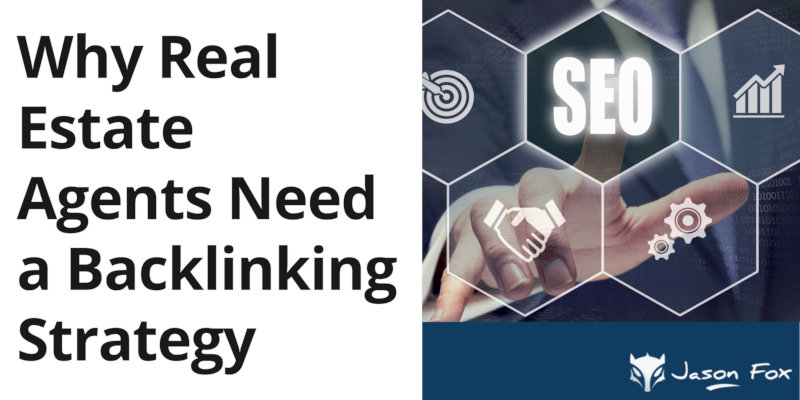Contents
It’s a bit reductive to say that real estate agents only advise clients and close deals. In all actuality, agents become a one-person marketing and sales team as soon as they step into this role.
As an agent, you bear all of the responsibility of producing promotional content, marketing said content, and earning the trust of the prospective clients you want to convert.
You have to sell people on your personal brand before they’ll let you represent them as a buyer or seller agent. And that’s why it’s so important to adopt the mindset of a digital marketer early on.
To thrive in an already competitive housing market, you need to think outside of the box (i.e., your own online and social domains). This means promoting your business and the properties you represent where your qualified prospects are most likely to see it.
This is where a solid backlinking strategy comes in.
There are four core reasons why real estate agents should be intentional about link building with external links, or backlinks. Not only will we outline these reasons in this guide, we’ll also share how you can better identify good link building opportunities versus bad ones.
First Things First: What Are Backlinks?
True to its name, a backlink is a hyperlink that is embedded on one website and directs back to a piece of content on another website.
So long as the link is “do-follow” and not “no-follow,” Google and other search engines track each time someone else links to your content.
When this happens regularly, Google assigns more value to your content and starts ranking your content higher on search engine results pages (SERPs).
From a digital marketing and SEO perspective, this is exactly what you want.
Let’s say a prospective home buyer comes across a link to your About page, blog, or other content when reading an article about the local housing market.
This prospect can then click-through to your content, learn more about you, and contact you directly.
Without doing much (if any) work on your end, you’re able to spread brand awareness, generate new leads, and get more traffic to your website with a single backlink.
Now, you could hope and wait for other bloggers to potentially link to your content. Or you could be extremely intentional about seeking these bloggers out and asking them to link to your content on their site.
If you’re serious about increasing the amount of backlinks to your content, you’ll want to take the latter approach and develop a strong backlinking strategy.
Before we share why and how you can do this, let’s first talk about how local SEO factors into the backlinking process for real estate agents.
Here’s Where Local SEO Comes In
Local SEO is a big deal for real estate agents, and that’s because the people that you’re trying to reach and work with are using phrases like “near me” or “close by” to find the most relevant results in search engines like Google.
For example, a search term like “houses for sale near me” gets more than 400,000 searches in Google.
If a blog post with this search term ranks on the first page of Google and backlinks to your content, your business is instantly more visible and accessible to a large audience.
So, think of backlinking as an extension of your local SEO strategy.
If you already know what your target audience is searching for and what type of content shows up in the search results, use this information to start planning out your backlink strategy.
Create a list of blogs and websites that show up in location-based, real estate-related searches. From there, you can get in touch with the right people about potentially placing a backlink on their site.
To make it more compelling for them, you can offer to do a link exchange — which means that you’ll link to their content on your website if they do the same for you. It’s a simple process that gives both parties an SEO advantage, and all it requires is a straightforward agreement.
4 Reasons Real Estate Agents Use Backlinks
We’ve scratched the surface of why real estate agents stand to benefit from strategic backlinking and local SEO, but let’s go a step further.
Here are four key reasons (and ways) you can leverage backlinking to your advantage in the real estate market:
1. Backlinks Aren’t Limited to One Type of Content
Any content that you create and publish on your site can be used as a backlink, so long as the quality is there.
Linkable assets come in many forms — an educational blog post, a property tour video, a landing page with information for first-time home buyers, etc. — so don’t be afraid to think big and create different types of content.
As you pursue backlinking opportunities with other websites and blogs, do your due diligence to find out which of your linkable assets will be most relevant and appealing to that source’s site visitors.
2. Backlinks Are Good For Your Reputation
Social proof doesn’t just come in the form of client testimonials and reviews.
When a reputable site links to one of your linkable assets, this signals to their site visitors that your business is also reputable. When 15 reputable and high-ranking sites give you a backlink, this social proof is even more impactful.
As long as the backlinks meet the criteria we’ll cover in the next section, your reputation will receive a boost, and you’ll get more exposure to potential clients at the same time.
3. Backlinks Can Expand Your Sphere of Influence
As a real estate agent, you’re no stranger to Sphere of Influence (SOI) emails like the one below:
Odds are, you’ve devoted a lot of time into cultivating and maintaining relationships with former clients, friends, and other contacts that make up your current Sphere of Influence.
When it comes to expanding your outreach and SOI, a backlinking strategy is an effective way to get your name out there and start making new contacts.
One approach you can take is to include a lead magnet (i.e., a downloadable template, e-book, tips, etc.) with your linkable asset. That way, a site visitor who clicks-through your backlink can then submit their name and email address to access the free resource.
They get a valuable resource, and you get a new contact to add to your email list.
4. Backlinks Give You a Competitive Edge
Unless you work in digital marketing or have been picking up some tips and tricks on your own, you might not consider — or even know about — using backlinking for real estate marketing purposes.
While you’re not directly competing with all 3 million+ real estate agents in the U.S., the real estate market is highly competitive. To stand out among your local competitors, it helps to have a few digital marketing tricks up your sleeve.
Building a backlinking strategy is a great way to get your name out there, generate more social proof, and give prospective clients a reason to choose to work with you instead of someone else.
Not All Backlinks Are Created Equal
While there are many perks to this type of link building, there is such a thing as a bad backlinking opportunity.
Before requesting a backlink on another website or blog, consider these three factors:
1. Relevancy
It’s a golden rule in digital marketing that you have to meet your target audience where they’re at, not where you want them to be.
This is to say that a blog or website might be reputable and optimized but still not be a great fit for backlinking purposes if it lacks relevance.
As a real estate agent, you’re targeting a niche audience of home buyers and sellers, primarily. To make sure that your backlinks are as effective as possible, you want to strategically feature these links on websites that are relevant to this audience.
The previous “houses for sale near me” illustration is a great example of this.
It would be better to include your backlink on a blog post about a real estate-related topic than a blog post about, say, the best travel destinations in 2021.
The more relevant the blog or website is, the more likely site visitors are to click-through your backlink.
2. Domain Authority
There’s a reason (well, several) why you want reputable blogs and websites to link to your content: high ranking content on SERPs receives 3.8 times more backlinks than lower ranking content.
As this high ranking content accumulates new traffic and engagement, so do your backlinks.
Evaluating a website’s domain authority will instantly tell you whether or not you should consider pursuing a backlinking opportunity. Here’s why.
Domain authority is a score that ranks website performance. A high score indicates that a website’s content is extremely likely to show up on SERPs (which means that your backlinks would be more visible and get more traffic).
But even if the content is relevant, a backlink won’t generate the type of results you want if the website has a low domain authority.
And that’s because a low score signals that 1) the website could be poorly optimized, 2) the site’s visitors could be unengaged, and 3) the content isn’t highly ranked on SERPs.
3. Variety
The third and final factor to consider when fine-tuning your backlinking strategy is variety. Here’s what we mean by that.
You could partner with a relevant, reputable website and generate 2,000 backlinks from this source over a certain period of time.
But while this is great — and can do a lot of good for your business — embedding backlinks exclusively through this one source isn’t as impactful as you might hope. You’ll market yourself pretty heavily to visitors on that site, but you’re overlooking all of the alternatives — alternatives where potential customers are already spending time.
It’s more effective to feature your backlinks across various blogs and websites that check off all of your boxes in terms of relevancy and domain authority — and that’s even if you generate fewer backlinks.
As more websites embed your backlinks, this signals to Google and other search engines that your content is in high demand and valuable to searchers.
By considering these three factors ahead of time, you’re able to create a backlinking strategy that will be highly effective in the long-term.
It’s a process that will not only spread your brand awareness, but also organically target the exact customers you’d normally have to chase down on your own. And that makes backlinking an invaluable tool to help you grow your business without quadrupling the amount of work you have to put into it.

Written by : Mackenzie Scott
Mackenzie is a copywriter at Soundstripe, a stock music company that provides filmmakers, creators, and advertisers with royalty free sports music and royalty free country music (among other genres) for video.



